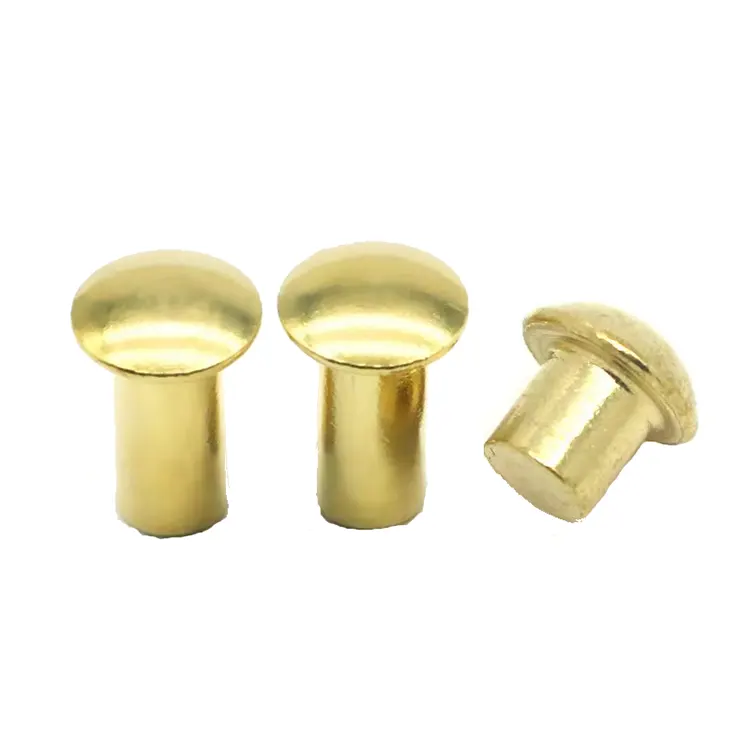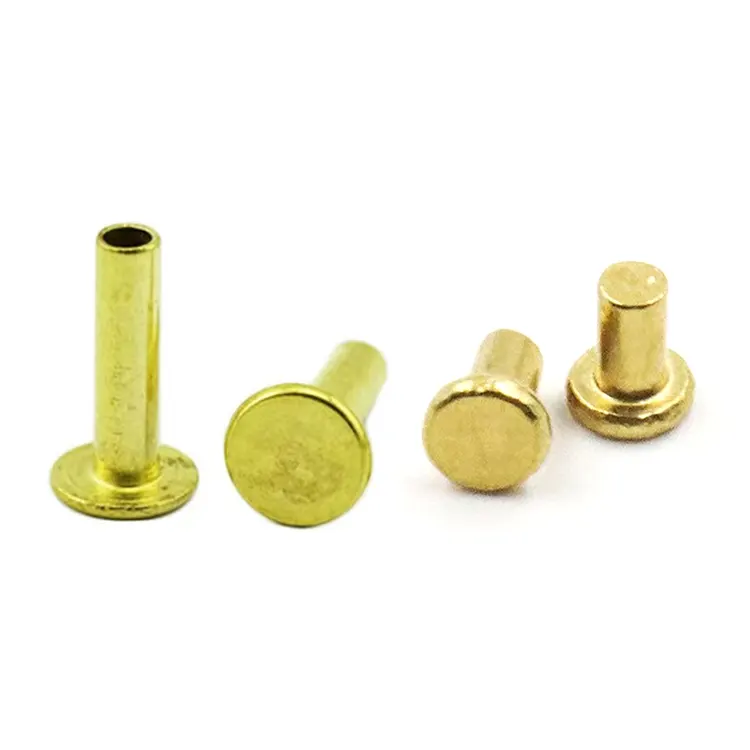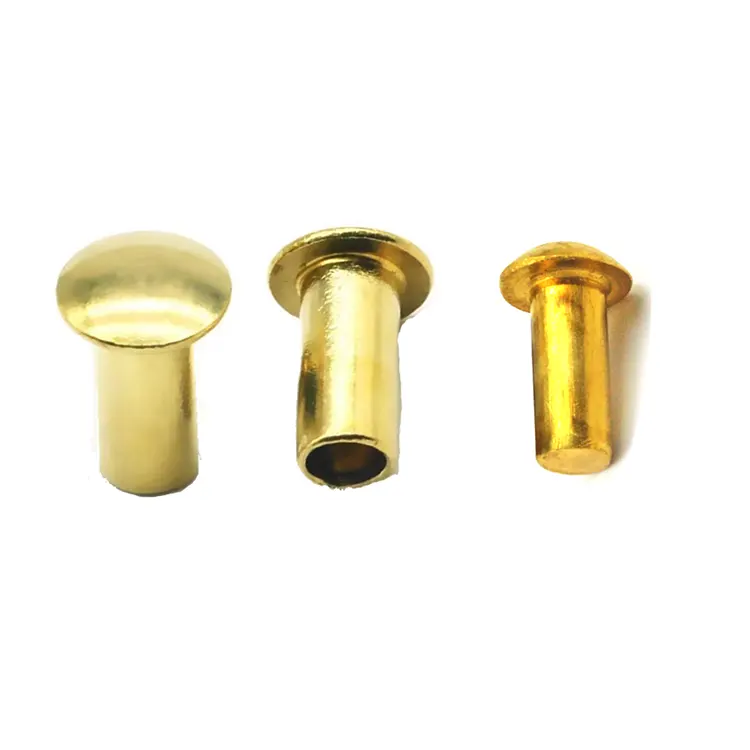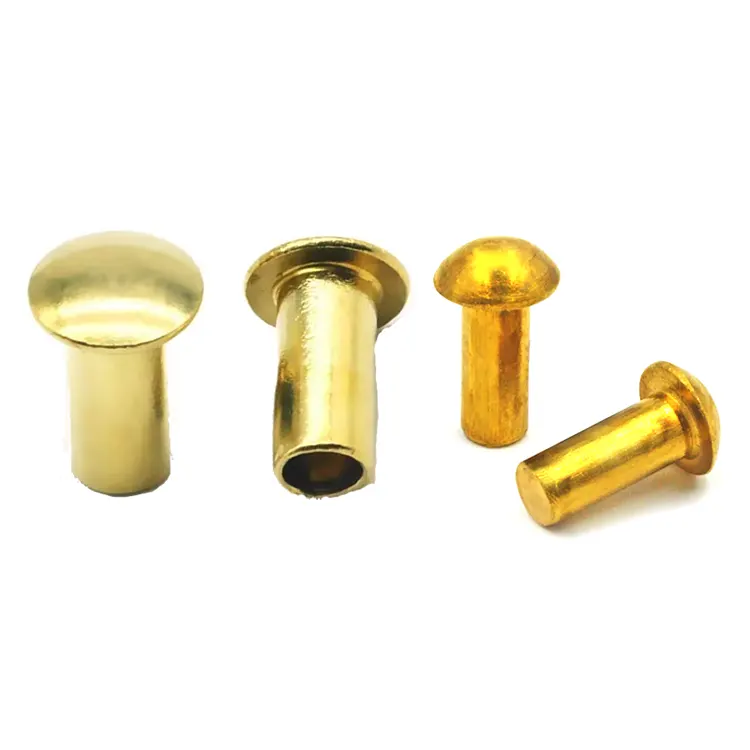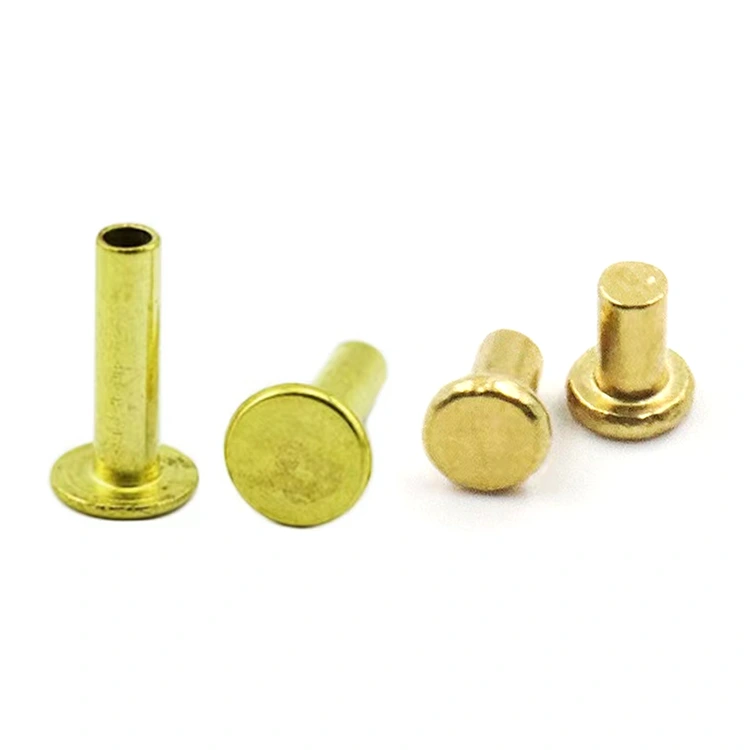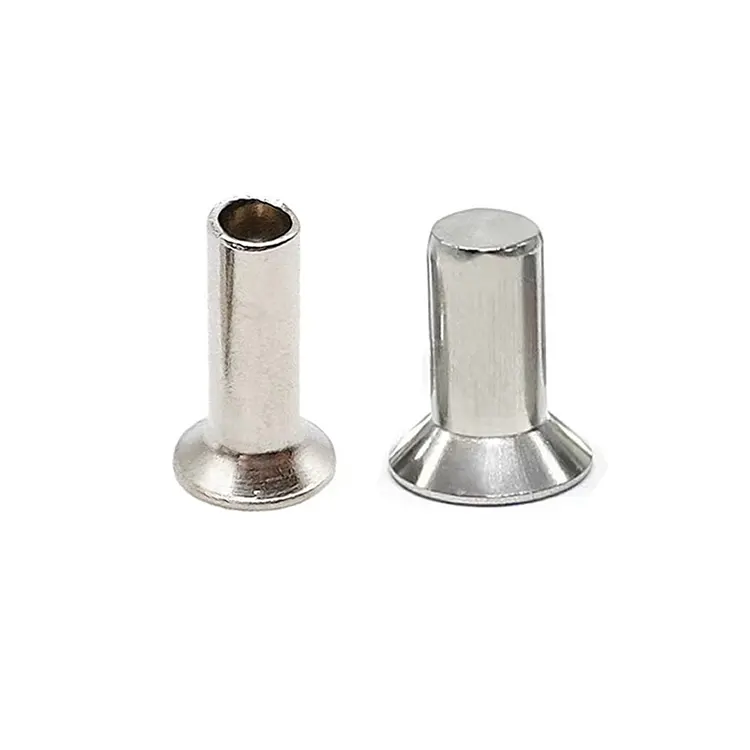Nieten
As one of professional manufacturer in China, Notin would like to provide you Rivets. And we will offer you the best after-sale service and timely delivery.
What is a rivet?
A rivet is a permanent mechanical fastener used to join two or more materials. Rivets work by inserting a metal pin into an aligned hole and deforming the end, creating a strong, secure, and durable connection. Unlike temporary fasteners like screws, rivets do not rely on threads, but instead form a permanent connection, making them ideal for applications requiring high strength, durability, and vibration resistance.
Classification of Rivets
Rivets are typically categorized by head shape, degree of hollowness, or material.
Based on head shape, rivets can be classified as flat head rivets, round head rivets, countersunk head rivets, mushroom head rivets, universal head rivets, truss head rivets, etc.

Based on degree of hollowness, rivets can be classified as solid rivets, semi-tubular rivets, or full tubular rivets.
Based on material, rivets can be classified as brass rivets, stainless steel rivets, steel rivets, aluminum rivets, copper rivets, etc.

What surface finishes are available for rivets?
Rivet surfaces are typically treated with rust-proofing treatments, primarily electroplating, including zinc plating, nickel plating, chrome plating, tin plating, gold plating, and silver plating. Electroplating is a common rust-proofing method for rivets. It applies a layer of plating to the rivet surface through physical or chemical methods. The plating effectively prevents corrosion and rust, while also providing a certain aesthetic effect.
Another special surface treatment method is head coating. Head coating is performed after the rivet is electroplated. This allows for a variety of colors on the rivet head, achieving an aesthetically pleasing finish.
Aluminum rivets cannot be electroplated, but they can be anodized. Anodizing also allows for a variety of color options, but the unit price is higher than electroplating.
Rust-proofing the rivet surface is crucial, effectively extending the rivet's service life and ensuring a secure connection. Different rust-proofing methods are suitable for different environments and applications, so the choice should be tailored to the specific situation.
- View as
Messing-Rundkopfnieten
Nuote Metals ist auf die Herstellung und den Verkauf von Messing-Rundkopfnieten spezialisiert. Wir befinden uns in Dongguan, China, einer Stadt mit einer starken industriellen Entwicklung. Unsere Halbrundkopfnieten aus Kupfer bestehen aus einem Schaft und einer Kappe aus einer Messinglegierung. Das halbgewölbte Kopfdesign sorgt für eine gleichmäßige Druckverteilung und verhindert so Schäden an der Gelenkoberfläche. Sie zeichnen sich durch ihre kombinierte elektrische Leitfähigkeit und Korrosionsbeständigkeit, einfache Konstruktion, einfache Installation, hohe Zuverlässigkeit und lange Lebensdauer aus.
WeiterlesenAnfrage absendenMessingnieten
Nuote Metals produziert Messingnieten in China. Messingnieten bestehen hauptsächlich aus einer Kupfer-Zink-Legierung, einem Material, das eine Reihe von Vorteilen bietet. Dank der hervorragenden Korrosionsbeständigkeit von Messing übersteht es den langfristigen Einsatz in feuchten Umgebungen ohne zu rosten und eignet sich daher für den Einsatz im Freien oder unter Bedingungen mit hoher Luftfeuchtigkeit. Messing verfügt außerdem über Festigkeit und Härte, sodass es mechanischer Beanspruchung standhält und gleichzeitig eine gute Zähigkeit und Bruchfestigkeit beibehält. Messing verfügt außerdem über eine hervorragende elektrische und thermische Leitfähigkeit und eignet sich daher für den Einsatz in elektronischen und thermischen Geräten. Die glatte Oberfläche von Messing ermöglicht ein einfaches Galvanisieren oder Polieren und verbessert so die Ästhetik. Diese Eigenschaften machen Messingnieten in vielen Branchen zur bevorzugten Wahl.
WeiterlesenAnfrage absendenFlachkopfnieten aus Messing
Nuote Metals ist auf die Herstellung von Flachkopfnieten aus Messing spezialisiert. Unsere Nieten bestehen aus H65-Messing, das einen hohen Messinganteil hat, weich und leicht formbar ist und beim Nietvorgang weniger leicht reißt. Flachkopfnieten aus Messing bestehen aus einem Kopf und einem Schaft, wobei der Schaft etwa auf der Hälfte seiner Länge hohl ist. Bei der Montage wird der Niet in ein vorgebohrtes Loch eingeführt. Mit Hilfe einer speziellen Nietmaschine und eines Stempels weitet sich das Ende des Schafts auf und formt auf der anderen Seite den Kopf, wodurch eine Klemmverbindung entsteht. Dieser Prozess beruht auf der plastischen Verformung des Metalls, sodass kein Schweißen oder Kleben erforderlich ist, was ihn einfach und effizient macht.
WeiterlesenAnfrage absendenMessing-Pilzkopfnieten
Messing-Pilzkopfnieten bestehen aus einem Kopf und einem Körper. Der Kopf ist rund und leicht abgeflacht und ähnelt einem Pilzhut. Der Körper ist halbhohl, das heißt, er hat ein Loch in der Mitte, geht aber nicht vollständig durch. Diese werden als halbhohle Pilzkopfnieten aus Messing bezeichnet. Einige Nieten haben einen massiven Körper, sogenannte massive Messing-Pilzkopfnieten. Bei der Montage wird das Gehäuse mit einem Spezialwerkzeug in das vorgebohrte Loch eingesetzt. Durch Druck wird der Körper verformt, wodurch er sich ausdehnt und das Material festhält, wodurch eine sichere Verbindung entsteht. Nuote Metals ist auf die Herstellung dieser Messing-Pilzkopfnieten spezialisiert.
WeiterlesenAnfrage absendenFlachkopfnieten aus Messing
Flachkopfnieten aus Messing sind Metallstäbe mit einer Kappe an einem Ende. Sie erreichen die Vernietung durch Verformung oder Presspassung und sind ein gängiges Befestigungselement. Das flache Kopfdesign reduziert Oberflächenvorsprünge und eignet sich daher für Anwendungen, die eine hohe Ebenheit erfordern. Die Korrosionsbeständigkeit von Messing gewährleistet die Stabilität der Verbindung auch in feuchten und korrosiven Umgebungen. Nuote Metals ist auf die Herstellung von Flachkopfnieten aus Messing spezialisiert. Wir verfügen über Tausende von Formen und können eine Vielzahl von Nietspezifikationen herstellen. Wir unterstützen auch kundenspezifische Designs und Muster.
WeiterlesenAnfrage absendenSenkkopfnieten aus Messing
Messing-Senkkopfnieten bestehen im Wesentlichen aus einem Kopf und einem Schaft. Der versenkte Kopf ermöglicht eine bündige Installation mit der Werkstückoberfläche und eliminiert Vorsprünge, die das Aussehen oder die Funktion beeinträchtigen könnten. Beim Nietvorgang verformt sich der Halbhohlschaft und es entsteht eine Verbindung. Dieses Design verbessert nicht nur die Installationseffizienz, sondern erhöht auch die Verbindungszuverlässigkeit. Nuote Metals ist auf die Herstellung von Senkkopfnieten aus Messing spezialisiert und zeichnet sich durch hohe Präzision und eine glatte, kratzfreie Oberfläche aus. Wir heißen Freunde aus der ganzen Welt willkommen, unser Unternehmen zu besuchen und mit uns zusammenzuarbeiten.
WeiterlesenAnfrage absendenWhat are the advantages of rivets over other fasteners?
1. Ease of Installation
Rivets are fast to install, and even fully automated for high-volume applications, resulting in a simple and efficient operation process.
2. Connection Reliability
The riveting process is standardized, with strict quality control, resulting in highly stable connections. Visual inspection allows for quick verification of connection quality.
3. Vibration and Impact Resistance
Rivets connect through deformation or interference fit, providing strong clamping force and excellent vibration resistance, capable of withstanding vibration and shock.
4. Low Cost
Rivets are easy to install and can be fully automated, saving significant labor costs.
What are the advantages and disadvantages of rivets made of different materials?
Aluminum Rivets
Advantages: Lightweight, reduces overall product weight, low cost, suitable for general civilian applications.
Disadvantages: Low tensile and shear strength, unsuitable for high-strength workpieces, prone to electrochemical corrosion when in contact with metals such as stainless steel.
Stainless Steel Rivets
Advantages: Strong corrosion resistance, high hardness, suitable for high-strength workpieces (such as marine equipment)
Disadvantages: Higher cost, typically more expensive than aluminum rivets of the same specification.
Brass and Copper Rivets
Advantages: Excellent conductivity (such as connecting electronic components), good corrosion resistance.
Disadvantages: Higher cost, more difficult to process.
Steel Rivets
Advantages: High hardness, high connection reliability, and wide applicability.
Disadvantages: Compared to other materials, iron rivets are more prone to rusting.
What are the main applications of rivets?
Rivets have a wide range of uses, from small items like a pair of scissors to large items like airplanes and ships, as well as in high-precision medical applications.
Industrial Manufacturing
Rivets are used in a wide variety of industrial fields, wherever there is a need to connect two or more materials.
Electronics
Rivets secure heat sinks and chips, providing both vibration damping and noise reduction, and are widely used in the cooling systems of electronic products such as computers and mobile phones.
Automotive
Rivets are widely used to connect components of automobile bodies and chassis, such as doors and hoods. Their lightweight and corrosion-resistant properties make them an indispensable joining method in automotive manufacturing.
Aerospace
In aircraft manufacturing, rivets are used to connect different fuselage components, such as wings and tailplanes. Millions of rivets create high-strength, corrosion-resistant joints. Aluminum and titanium alloy rivets are often used to connect components of corresponding materials, ensuring stability in extreme environments.
Rivets are used everywhere. The above examples only represent a small number of their applications. We see rivets everywhere in our daily lives, such as on scissors, folding beds, and strollers etc. Rivets can be customized to different sizes and materials depending on the application.
Nuote Metals has specialized in the rivet industry for over a decade. Our factory is located in Dongguan, a city known as the "World Factory," a city with a developed industry and convenient transportation. This allows us to respond quickly when acquiring raw materials and supporting surface treatments, meeting our customers' needs for quick access to samples and bulk orders. We produce 10 million rivets daily and have molds of various specifications, allowing us to produce rivets as small as 0.8mm and as large as 10mm. We welcome your inquiries and visits.







